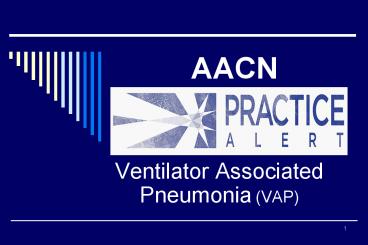AACN PowerPoint PPT Presentation
1 / 19
Title: AACN
1
AACN
- Ventilator Associated Pneumonia (VAP)
2
Prevention of Ventilator Associated Pneumonia
(VAP)
AACN VAP Practice Alert
3
Lecture Content
- Epidemiology of VAP
- Prevention strategies
- HOB elevation
- Ventilator equipment changes
- Continuous removal of subglottic secretions
- Handwashing
AACN VAP Practice Alert
4
Epidemiology of Ventilator Associated Pneumonia
(VAP)
AACN VAP Practice Alert
5
Nosocomial Pneumonias
- Account for 15 of all hospital associated
infections - Account for 27 of all MICU acquired infections
- Primary risk factor is mechanical ventilation
(risk 6 to 21 times the rate for nonventilated
patients)
CDC Guideline for Prevention of Healthcare
Associated Pneumonias 2003 Cook et al, Ann Intern
Med 1998129433
AACN VAP Practice Alert
6
Critical Care Interventions Increase
Susceptibility to Nosocomial Pneumonias
Increased Nosocomial Pneumonias
Altered Host Defenses
Tracheal Colonization
Intubation
AACN VAP Practice Alert
7
VAP Etiology
- Most are bacterial pathogens, with Gram negative
bacilli common - Pseudomonas aeruginosa
- Proteus spp
- Acinetobacter spp
- Staphlococcus aureus
- Early VAP associated with non-multi-antibiotic-res
istant organisms - Late VAP associated with antibiotic-resistant
organism
AACN VAP Practice Alert
8
Significance of Nosocomial Pneumonias
- Mortality ranges from 20 to 41, depending on
infecting organism, antecedent antimicrobial
therapy, and underlying disease(s) - Leading cause of mortality from nosocomial
infections in hospitals
CDC Guideline for Prevention of Healthcare
Associated Pneumonias 2003 Heyland et al, Am J
Respir Crit Care Med 19991591249 Bercault et
al, Crit Care Med 2001292303
AACN VAP Practice Alert
9
Significance of Nosocomial Pneumonias
- Increases ventilatory support requirements and
ICU stay by 4.3 days - Increases hospital LOS by 4 to 9 days
- Increases cost - 20,000 to 40,000 per episode
- Estimates of VAP cost / year for nation gt 1.2
billion
Heyland et al, Am J Respir Crit Care Med
19991591249 Craven D. Chest 2000117186-187S R
ello et al, Chest 20021222115
AACN VAP Practice Alert
10
VAP Prevention
AACN VAP Practice Alert
11
Continuous Removal of Subglottic Secretions
- Use an ET tube with continuous suction through a
dorsal lumen above the cuff to prevent drainage
accumulation
CDC Guideline for Prevention of Healthcare
Associated Pneumonias 2003 Kollef et al, Chest
19991161339
AACN VAP Practice Alert
12
HOB Elevation
HOB at 30-45o
CDC Guideline for Prevention of Healthcare
Associated Pneumonias 2003 Drakulovic et al,
Lancet 19993541851
AACN VAP Practice Alert
13
Frequency of Equipment Changes
No Routine Changes
Ventilator Tubing
Not Enough Data
Inner Cannulas of Trachs
Between Patients
Ambu Bags
AACN VAP Practice Alert
CDC Guideline for Prevention of Healthcare
Associated Pneumonias 2003
14
Handwashing
What role does handwashing play in nosocomial
pneumonias?
AACN VAP Practice Alert
Albert, NEJM 1981 Preston, AJM 1981 Tablan, 1994
15
VAP Prevention
- Wash hands before and after suctioning, touching
ventilator equipment, and/or coming into contact
with respiratory secretions.
All recommendations are level IA
CDC Guideline for Prevention of Healthcare
Associated Pneumonias 2003 AACN Practice Alert
for VAP, 2004
AACN VAP Practice Alert
16
VAP Prevention
- Use a continuous subglottic suction ET tube for
intubations expected to be gt 24 hours - Keep the HOB elevated to at least 30 degrees
unless medically contraindicated
All recommendations are level II
CDC Guideline for Prevention of Healthcare
Associated Pneumonias 2003 AACN Practice Alert
for VAP, 2004
AACN VAP Practice Alert
17
No Data to Support These Strategies
- Use of small bore versus large bore gastric tubes
- Continuous versus bolus feeding
- Gastric versus small intestine tubes
- Closed versus open suctioning methods
- Kinetic beds
AACN VAP Practice Alert
CDC Guideline for Prevention of Healthcare
Associated Pneumonias 2003
18
Oral Care
- Role of oral care, colonization of the
oropharynx, and VAP unclear dental plaque may
be involved as a reservoir - Limited research on impact of rigorous oral care
to alter VAP rates - Surveys indicate most nurses use foam swabs
rather than toothbrushes in intubated patients
CDC Guideline for Prevention of Healthcare
Associated Pneumonias 2003 Grap M. Amer J of
Critical Care 200312113-119.
AACN VAP Practice Alert
19
- Thanks
- for your attention

